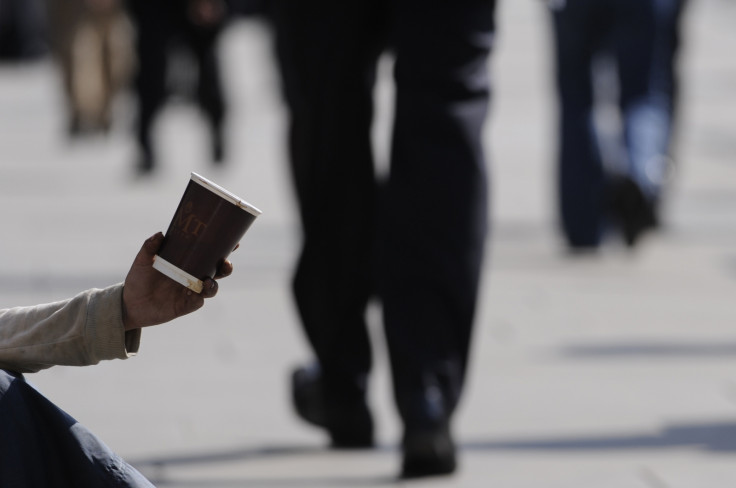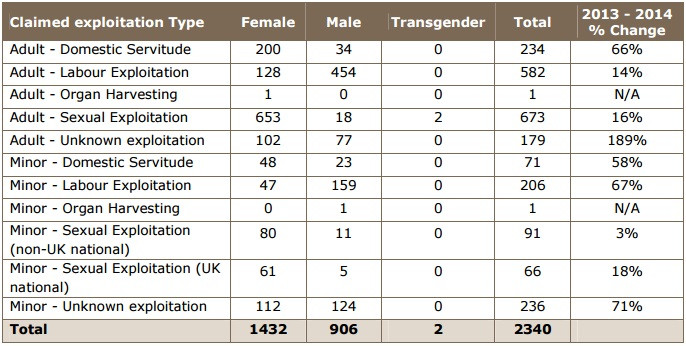UN World Day Against Child Labour: Crime gangs trafficking children to Britain on the rise

Walk down Oxford Street in central London, amid the throng of shoppers and workers, and you might spot a glum-faced child, propped up by the wall of a shop, their hand outstretched. You are not walking the impoverished Dickensian streets of the nineteenth century. It is 2015. The British economy is advanced and wealthy. Oxford Street's flagship shops and designer stores are a magnet for the moneyed. Yet even today some children are working these streets as beggars.
Organised criminal gangs traffick some here. Their own families put others to work. Sent out onto the street day in, day out to generate income from the generosity of sympathetic passing strangers. We can see these children as pests. Irritants who cause trouble, break the law and harass people. They may be all these things. But many are, above all, victims of exploitation by adults. It is child labour and it must stop. On the UN's World Day Against Child Labour, we ask: What is the scale of the problem in the UK?
Klara Skrivankova, Europe programme and advocacy co-ordinator for Anti-Slavery International, a charity tackling child labour, tells IBTimes UK:
I don't think anybody knows that. Generally, it's not just a UK problem -- that's the important thing. It's a problem across the whole of Europe. And I think there is also a lot of confusion about how and to what extent this might represent an incident of trafficking. So people actually being coerced into doing it and to what extent there is no coercion involved. We certainly see both instances and of course it's very difficult in discerning between the two just with the naked eye.
The estimates generally go into hundreds, but it may be more people across Europe at any given time. The fact that we're seeing the issue in the UK doesn't mean that it's not going to move over to another country tomorrow or vice-versa.
Reliable statistics are hard to come by. The sturdiest are cases identified by the authorities, be it a local council or police force. But these do not include those still under the radar. Begging gangs tend to work as a team. They spot for one another, keeping eyes open for police. They move on quickly.
The National Crime Agency compiles trafficking data. It shows a sharp increase over just one year from 2013 to 2014.
There were 671 referrals of minors to the National Referral Mechanism (NRM), which the NCA describes as "a process to identify individuals who may be potential victims of trafficking and provide them with the protection and support to which they are entitled".
The gender split was 348 female and 323 male. Albania was the single largest country of origin (117) after a 109% annual increase. Vietnam was second (109) with a 43% rise, the UK third (75) after a 19% rise. But the single largest increase came from Slovakia in fourth place (72) -- a staggering 1,900% jump. Labour exploitation, which includes forced child begging, accounted for the largest share of known exploitation. There were 206 cases in 2014, an annual leap of 67%.


Hopelessness, depression, shame
A 2008 paper by Yvonne Rafferty of New York's Pace University, titled The Impact of Trafficking on Children: Psychological and Social Policy Perspectives, highlighted the traumas caused by child labour. Trafficking deprives children of an education. It puts them at a severe economic disadvantage later in life.
"Related research has identified adverse outcomes of educational deprivation among victims of neglect (psychological and emotional) and abuse (physical and sexual)," Rafferty's paper said. "Outcomes include developmental delays, language and cognitive difficulties, deficits in verbal and memory skills, poorer academic performance, and grade retention."
What is more, they face health problems associated with "inhumane living conditions, inadequate diet and hygiene, beatings and abuse, neglect, and denial of their basic human rights to health care and protection".
"Although empirical studies have not assessed the psychological impact of child trafficking," Rafferty wrote, "case studies have reported adverse emotional effects among trafficked children, including depression, hopelessness, guilt, shame, flashbacks, nightmares, loss of confidence, lower self-esteem, and anxiety.
"The negative messages they routinely receive can influence their sense of worth, leading to feelings of self-blame."
Skrivankova of Anti-Slavery International says:
Generally, if you think about somebody who is forced to survive in an environment, they will develop certain coping mechanisms which can then mean they are more prone to violence.
Or when it comes to women, they might also be more prone to pathological relationships and being victims of violence themselves. There is a risk of rape and them being procured into prostitution. The risks are quite high.
If you fail the children early on, this sort of life will be the only life they know. So they will not necessarily be able to easily discern between a relationship that is a healthy one and a relationship that is based on manipulation and exploitation. It's very difficult then to undo that later in their life.
Culture of disbelief
We need to change the way we view child begging. Authorities are not asking enough probing questions. Some local councils are shifting the problem to another area by introducing punitive laws against begging. Sometimes foreign children are not believed when they say they are victims of exploitation.
Skrivankova says:
Very often there is a whole culture of disbelief. There is also a whole tendency to move the problem away because it's costly and in the environment of cuts it's very difficult to go through all of these procedures. So in a way, we have seen a tendency -- not all of them, but some -- for local authorities to want to make the problem go away rather than deal with it and get to the bottom of it.
Often it's because people just cannot imagine -- especially if we are talking about children who are not necessarily the very young children and are maybe in their teens -- they are just seen as troublemakers, and would have probably been involved in some lower-level crime as well.
Poor or no English makes dealing with foreign children even more difficult. It is harder to determine where they came from, what risks they face and who is responsible for them.
Skrivankova says:
Then somebody comes, presents as their guardian, the authorities are going to happily hand the child over and just going to release them into somebody's custody and the problem goes away. There is no willingness to really engage in what has happened to the child.
Why are they on the street? Who are the people they are with? Who is controlling them? How would a child travel from one country to another and end up on a street of London knowing that this is a potential place where you could make money begging? How is that even conceivable that a young person, who doesn't speak much of the language and doesn't really know where they are, how would have they actually organised and masterminded it themselves?
You don't have to be educated in how organised crime works, or have too much knowledge actually, to start asking very critical questions. How is this possible? Often these questions aren't asked.
I know there is a lot of strain on local authorities, and there is loads of problems to deal with, but if we are failing to actually safeguard children we are only contributing to the problem and perpetuating it.
That's the bottom line. By failing children, we are actually reinforcing the criminality that is around them.
In 2013, Aberdeen council voted to criminalise begging in the city centre by introducing a local by-law. Campaigners accused the council of punishing the poorest and most vulnerable in society. But the council claimed it was acting to protect children pulled out of local schools and put onto the street to beg.
"These are Roma children who are costly to educate," former teacher and Aberdeen councillor Neil Cooney told the Daily Express. "If they are not going to school full-time and are having to keep their family place warm on the street, it doesn't help.
"These children are not getting the full education that they deserve so that they can actually make a better life for themselves. They're sort of stuck in the family begging business syndrome.
"I have sympathy with ordinary beggars, and we should give genuine cases all the help and support they need, but in this case children are being exploited for begging by organised gangs.
"We've got a duty of care to these children. To some extent they are slaves to the system and it has a gangland feel."
Child begging on London's streets was also the subject of a BBC Panorama documentary in 2011 by the investigative journalist John Sweeney. Children worked London's streets begging for money at all hours in an all weather, scrounging food from the bins of fast food restaurants. At the end of each day, they would hand up to £500 to their minders. Sweeney traced the beggars back to the villages in Romania from where they hailed. He found the men who bossed the gangs exploiting women and children. They lived comfortably in new houses off the spoils of the forced labour of those their gangs abused.
Deputy Chief Constable Dave Thompson, the National Police Chiefs' Council (NPCC) lead for gangs, tells IBTimes UK:
There is evidence to suggest that young people are being recruited into organised crime groups, both inside and out of the urban environment.
We are working closely with public sector partners, including health, education and the Home Office, to combat this disturbing trend. Our response is focused on prevention and support, as well as enforcement where crimes are believed to have taken place. A strategic group has been formed bringing together leaders from across the police service and operations are currently ongoing.
We recognise the vulnerability of young people and the unique risks involved. The police treat all reports of exploitation and abuse seriously and it is important victims feel able to approach us.
Skrivankova is sceptical of current efforts to tackle the ruthless gangs trafficking children:
One aspect is to make sure local authorities do what they are required to do, but also that there is a joined up approach because these groups are very mobile," she says.
So somebody say is begging on the streets of Birmingham today and local authorities start to respond positively, it's going to be much more difficult for the perpetrators to operate there so they move their operation elsewhere -- they might turn up in Glasgow.
And often the way how local authorities but also policing is run in this country, the dots are not being joined. So there is no monitoring of the movement of this particular group, for example, and it makes it very difficult to also police that. So the awareness that these are highly mobile groups and therefore we need to have a very sophisticated response to understand that people who might have been exploiting someone in one part of the country might be doing the same two days later in another part of the country.
Unless there is a system -- and there isn't currently -- to actually join the dots and do a proactive, co-operative operation, we would just be treating the symptoms.
© Copyright IBTimes 2024. All rights reserved.







